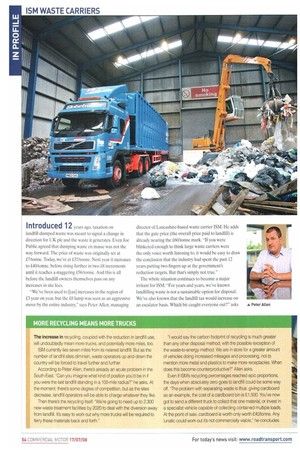MORE RECYCLING MEANS MORE TRUCKS
Page 54

If you've noticed an error in this article please click here to report it so we can fix it.
The increase in recycling, coupled with the reduction in landfill use, will undoubtedly mean mere trucks, and potentially more miles, too.
ISM currently lies seven miles from its nearest landfill. But as the number of landfill sites diminish, waste operators up and down the country will be forced to travel further and further.
According to Peter Allen, there's already an acute problem in the South-East. Can you imagine what kind of position you'd be in if you were the last landfill standing in a 100-mile radius?" he asks. At the moment, there's some degree of competition, but as the sites decrease, landfill operators will be able to charge whatever they like.
Then there's the recycling itself. "We're going to need up to 2,300 new waste treatment facilities by 2020 to deal with the diversion away from landfill. It's easy to work out why more trucks will be required to ferry these materials hack and forth." "I would say the carbon footprint of recycling is much greater than any other disposal method, with the possible exception of the waste-to-energy method. We are in store for a greater amount of vehicles doing increased mileages and processing, not to mention more metal and plastics to make more receptacles. When does this become counterproductive?" Allen asks.
Even if ISMS recycling percentages reached epic proportions, the days when absolutely zero goes to landfill could be some way off. 'The problem with separating waste is thus: giving cardboard as an example, the cost of a cardboard bin is £1,500. You've now got to send a different truck to collect that one material, or invest in a specialist vehicle capable of collecting contained multiple loads. At the point of sale, cardboard is worth only worth £.40/tonne. Any lunatic could work out it's not commercially viable." he concludes.












































































































































































